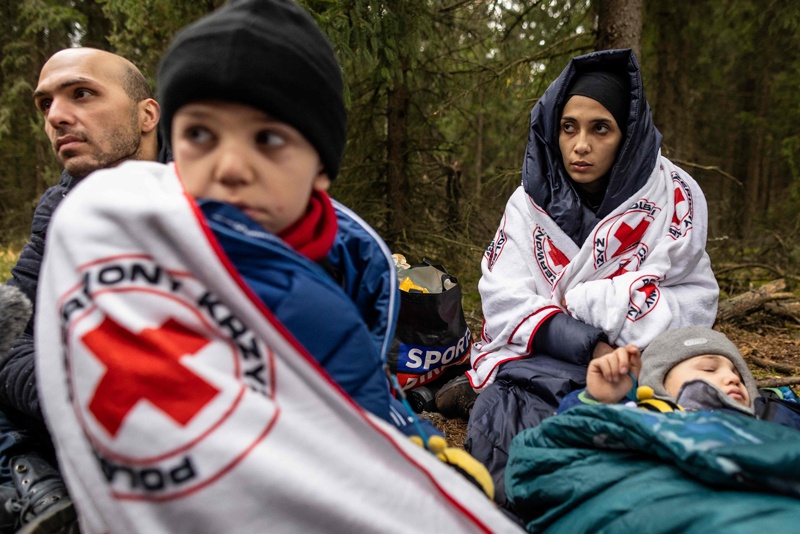 KLESZCZELE, Poland: The Massini family from Syria, father Muhammad (L), mother Alaa (C) and their two sons are seated while awaiting transport in the forest near the east Polish town of Kleszczele. Thousands of migrants, mostly from the Middle East have crossed or tried to cross from Belarus since the summer. – AFP
KLESZCZELE, Poland: The Massini family from Syria, father Muhammad (L), mother Alaa (C) and their two sons are seated while awaiting transport in the forest near the east Polish town of Kleszczele. Thousands of migrants, mostly from the Middle East have crossed or tried to cross from Belarus since the summer. – AFP
MICHALOWO: Huddled in a sleeping bag on the forest floor, a Syrian boy cracks a smile as a Polish rights activist walks a stuffed animal up his chest. She turns to his mother, leans in, clasps her hand and asks: "Everything okay?" The family of four has just spent a week in the cold, wet woods between Belarus and Poland, among thousands of migrants who have tried to cross into the European Union since the summer. Having embarked on the journey to seek treatment for their son with cerebral palsy, mother Ala Massini said they wound up caught between Belarus and Poland.
"They (Belarusian soldiers) told us we need to choose either death or Poland," the 25-year-old said under pine trees near the Polish town of Kleszczele. "We went to the Polish border to seek the help of the army and asked to cross because the children were hungry, sick and cold, but they told us to go back to Syria."
Stuck between a rock and a hard place, the Massinis got in touch with the Polish activist network Grupa Granica (Border Group), whose contact info has been circulating among the migrants. Volunteers arrived with dry clothes and food, and also provided legal help and served as a monitor when the guards came.
"It is very important to show them solidarity, human warmth, that they are not alone," said Marysia Zlonkiewicz, an activist with Grupa Granica. NGO workers, doctors, politicians and regular citizens are all finding ways to help out. "Lots of people have been reaching out. Many want to come and help search the woods for people needing our support, a warm meal, water, warm clothes," Zlonkiewicz told AFP.
Deaths on the border
The group estimates there are hundreds of migrants on the Polish side and thousands on the Belarus border-most of them being sent back and forth "like soccer balls", said Zlonkiewicz. Migrants say the Belarusian side refuses to let them return to Minsk and fly home, while the Poles refuse to let them cross and make asylum claims, instead pushing them back into Belarus.
Some migrants manage to evade the Polish guards and make it to neighbouring Germany, which has also seen an uptick in border crossings. The EU believes the Belarusian regime is deliberately sending the unprecedented wave of migrants-mainly from the Middle East-across the border in retaliation against EU sanctions.
The Polish government has adopted a hardline approach with pushbacks and a state of emergency that bans journalists and charity workers from the immediate border area. It is also planning a border wall. Several migrants have died trying to cross and border guards have reported incidents in which migrants threw sticks and stones at security forces.
'Humanitarian disaster'
The volunteer group Medycy na granicy (Medics on the Border) has called the situation "dramatic". Group coordinator Jakub Sieczko said they have found migrants suffering "exposure to the elements, dehydration, malnutrition".
"In several cases, people's lives were directly under threat," Sieczko said. "Unfortunately, the exclusion zone status means we cannot enter even though the area is facing a humanitarian disaster." Good Samaritans risk fines and arrests by venturing to the border area. A few residents of the restricted zone, who are exempt from the border ban, have also joined the effort.
One resident said it looked "a bit like war". "In some places there are military posts every 100 metres. These are whole campsites, with tents, fires," she told AFP. "Some guards are extremely aggressive," she said, but added that others did not like what was going on. One guard near Kleszczele told AFP she and her colleagues saw "the tragedy" of the migrants and tried to help them. "Never in a million years would we hurt anyone," she said close to tears. "These claims that we're taking their SIM cards and beating them-they're totally false."
'Winter is coming'
The nearby town of Michalowo made headlines when border guards sent a group of mostly migrant children and women back into the woods despite pleas for asylum. In response to the uproar, local officials set up a makeshift warehouse at the fire station, where rooms are now lined with bags and boxes full of jackets, blankets, nappies, canned food and other essentials.
"Winter is coming. If we don't do something, then it'll really lead to tragedy," mayor Marek Nazarko said at a protest against the pushbacks and border ban. Pensioner Krystyna Luczewska drove to the fire station from the nearby city of Bialystok with five bags of winter clothes in her car. "I feel for the kids especially. You see what's happening and..." the 66-year-old grandmother broke off in tears. An owner of a bed-and-breakfast near the border said two Iraqi men arrived on her doorstep freezing, soaking wet and exhausted. "I gave them tea. They wanted to pay for it, pulling out a $100 bill. I didn't take it," she told. - AFP




